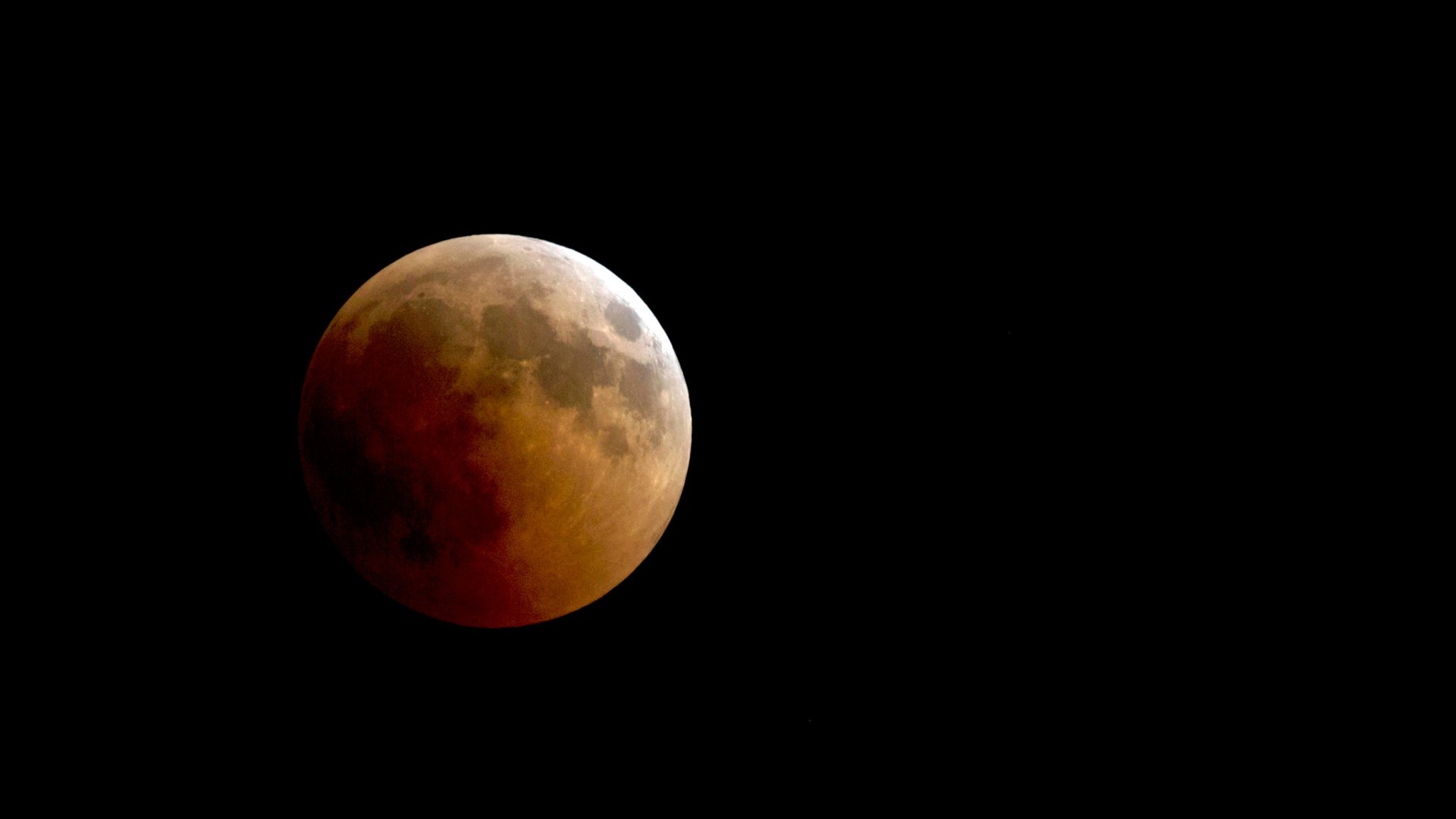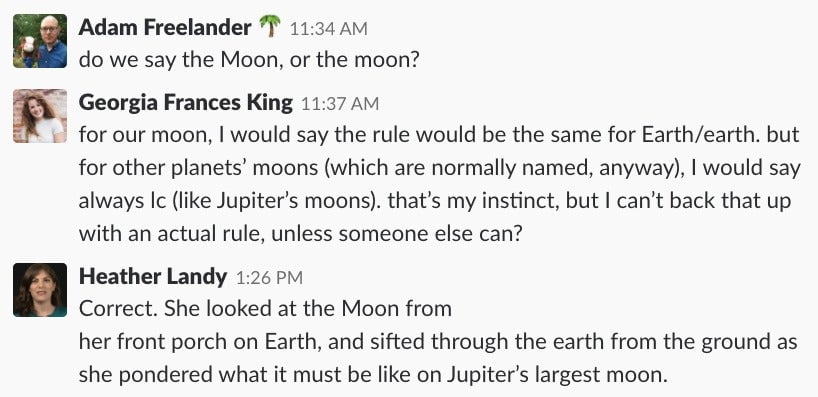Should you write “the Moon” or “the moon”? Writers weigh in
The moon is a large and peaceful rock that lives in outer space. It’s big, it glows, it’s friends with the stars, and it moves around in a curved and well-trodden path.


The moon is a large and peaceful rock that lives in outer space. It’s big, it glows, it’s friends with the stars, and it moves around in a curved and well-trodden path.
Do you know which moon I mean?
This is the question that has rocked the Quartz newsroom to its core over the past week, with friends and colleagues coming to virtual blows over whether or not to capitalize the word “moon” when referring to our closest celestial neighbor.
It all started with an innocent question posed to Quartz editors (and resident grammar czars) Heather Landy and Georgia Frances King. You can read the dramatic exchange below:

The argument in favor of capitalizing the Moon, according to Landy, is a matter of clarity for the reader, and respect for orbiting orbs in general. The Earth’s moon is not the only moon in the universe, after all. There are hundreds just in our own solar system, including 79 circling Jupiter alone. “The Moon [when referring to the one closest to Earth] should be capitalized to separate it from all of the other moons that are out there, although I realize this is Earth-centric,” Landy said in a follow-up interview.
It’s hard to argue with that logic! BUT NOT IMPOSSIBLE. Indeed, it seems that Quartz had inadvertently stumbled into a hotly contested debate. An informal Twitter poll by reporter Akshat Rathi shows that popular opinion is divided on the matter, although a majority (56%) are in favor of Moon capitalization.
And yet the minority camp of lowercase “moon” advocates have many strong arguments of their own. Read on to find out what they are, and tag us on Twitter (@qz) to let us know where you stand.
The case for capitalizing “Moon”
David Yanofsky, Things editor: This isn’t difficult. The Earth’s moon is the Moon. Jupiter’s moons are Io, Europa, Ganymede, Callisto, etc. This is Galileo’s true legacy: Our moon is just one of the many moons of the universe and its name is the Moon.
Michael Tabb, video journalist: There are millions of suns and moons out there, but our sun is the Sun, our moon is the Moon, our planet is Earth, but earth is the soil where you plant things. When you’re talking about specific places, you capitalize their names.
Mike Murphy, deputy editor: The Moon is a proper noun. It’s a place you can visit, so this is the only correct answer.
Zoë Schlanger, reporter: Capitalizing it just for the whimsy factor.
Adam Freelander, senior video producer:I just want to say this whole argument is kind of my fault because I was copy editing a video that had “the moon” lowercase and that looked weird to me, so I asked the grammar channel, and that was how the big mess began. But I always say, trust your instincts, and my original instinct was that “the moon” looked weird, so I am sticking with what I think are my good Moon instincts.
Jason Karaian, editor: If there were more than one natural satellite orbiting Earth, this probably wouldn’t be as controversial. Then, there would be Moon and—I dunno—Brian. Isn’t Brian looking lovely tonight? It’s my favorite of the moons. It’s awkward that the Moon’s proper name also describes what it is—like guys named Guy—but hey, we’re stuck with a decision made many Brians ago.
In favor of a lowercase “moon”
Akshat Rathi, reporter: Only as a science writer, as I am, do you have the right to argue about capitalizing the moon. That’s because the probability that a non-science writer would use “moon” to mean anything but the Earth’s moon is minuscule. And, even as a science writer, I’m not on the side of capitalization. In almost every context, it’s perfectly clear that the moon is our celestial neighbor. There is no need to capitalize unnecessarily because Capitalized Words Are Annoying.
Corinne Purtill, senior reporter: To my esteemed colleagues who would argue for capitalizing the moon: No. Never.
If a story fails to make clear which moon in the known universe is being discussed, then it suffers from greater problems than those of capitalization. And if the context is clear, why trip up the reader with the distracting capital M? Do we fear offending our readers on Europa?
This is not mere matter of style. It is about the unintended consequences of rigid adherence to grammatical rules. It is about our values, and the way our choices now will bend the arc of history.
Imagine, as an exercise, that we adopt the capitalized Moon. What next? Having turned our backs on common sense case choices, do we return to the Noun capitalization and other grammatical flourishes of the 18th Century? In what other ways shall we reject Progress? Are we careening toward a Future in which we disburse Upper-Case Letters freely, yet with-hold the Rights, Vaccines, and other societal Advance-ments our collective efforts have made possible? Slippery is that slope indeed.
Stand with me, friends, on the right side of history—not the dark side of the Moon.
Olivia Goldhill, reporter: The moon is a friendly, mystical place, whereas Moon is boring and practical, and has to abide by such onerous systems as capital letters and proper nouns. There’s a man who lives in the moon. He doesn’t live in the Moon.
Dave Gershgorn, reporter: What if I think it should be “our moon”? “Our moon” promotes a sense of community, and the only reason for not using it is that it would be confusing for anyone not born on Earth.
Susan Howson, deputy push editor: I can see both sides of the argument, but personally, capitalizing it looks funny to me. Like back when people said “to-day” and “break fast.” It does, though, seem that it’s a problem of a thing being a thing with also the name of that thing. Because other planets’ moons avoid this by having actual proper names, I propose that we rename our moon to Thor. Or whatever you want, I don’t know, we can take a vote or something. He’s just my favorite Avenger (hey, another thing that has the proper name version of what it also is!).
Ali Griswold, reporter: It is “moon,” all lower case, in Goodnight Moon, and I think we would all do well to defer to this classic of children’s literature.
Katherine Ellen Foley, reporter: I admire and respect all of my colleagues, but the ones who refer to the moon as the Moon are silly and wrong. Although we also write “Earth,” we’re referring to the planet as a proper noun. When we refer to “the earth” we mean the ground. We don’t call our closest rock friend Moon, because the moon was the first moon we knew—the very thing that gave us a definition of a moon! Writing the Moon feels like writing the Internet, and we all know it’s “internet.” The moon must remain lowercase.
Annalisa Merelli, reporter: I think if we let the Internet to become the internet, then we have to go with moon. Unless we’re for some reason listing the moons of the solar system planets, in which case I guess it’s Moon, the Earth’s moon. I think more importantly, we should ask ourselves: Do people listen to Pink Floyd’s The Dark Side of the Moon enough? Probably not.
ephrat livni, reporter: like feminist writer bell hooks, i believe in emphasizing ideas, not names of people, places, planets or moons. or, in the words of ee cummings, “i’m a small eye poet.” and so is my moon. (honestly tho, i’m fine with whatever style rule, just wanted to write this without capitalization).
The decision
Whatever the grammar czars say, goes. The Moon it is. Now don’t forget to go out and gaze at it once in a while.